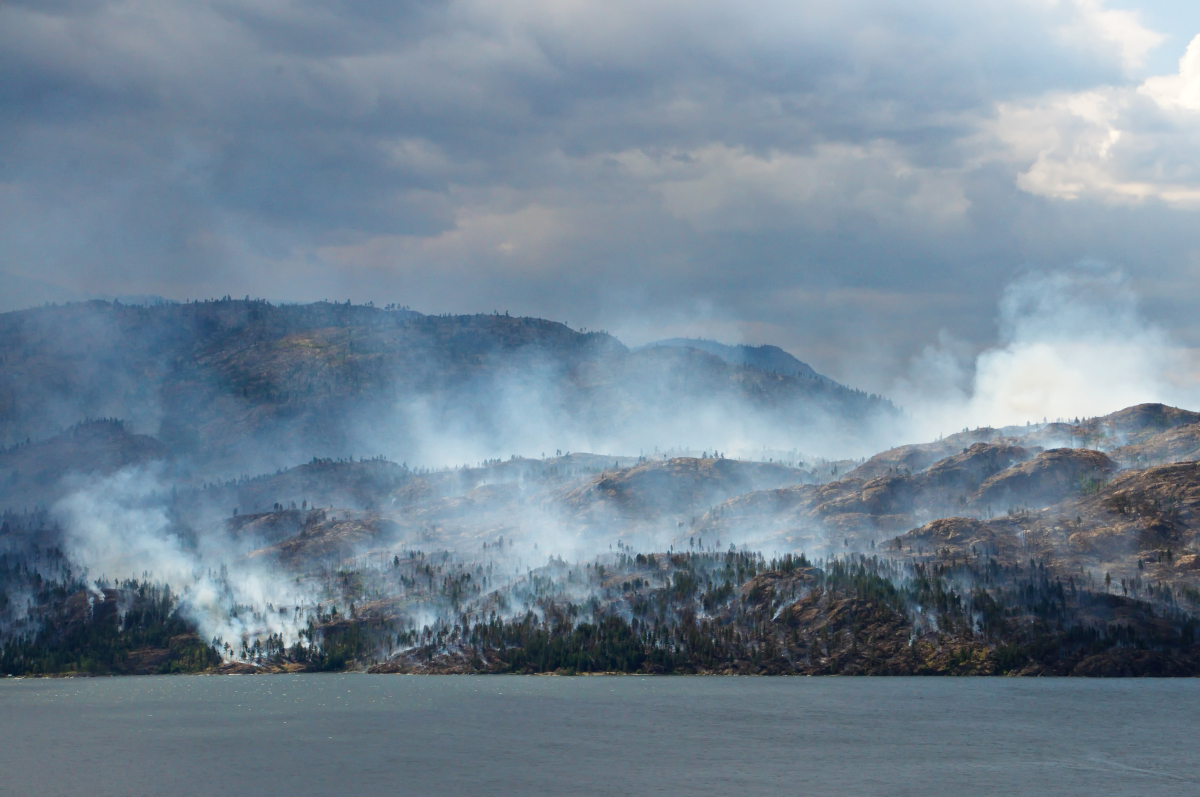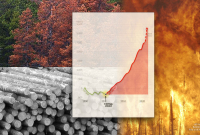Calls mount for a federal firefighting force

With tens of thousands of Canadians evacuated from their homes as wildfires rip through communities, calls are mounting on the federal government to establish a national firefighting agency.
On Wednesday morning, six members of the climate advocacy group On2Ottawa blocked the Laurier Bridge in Ottawa and were arrested on mischief charges. By disrupting traffic, the group hoped to force a spotlight on the wildfires raging across the country and issue a demand for a 50,000-strong national firefighting agency by next year.
“The reason we are demanding this is because we're in a state of emergency,” spokesperson Laura Sullivan told Canada’s National Observer. “Wildfire smoke has been choking out a lot of this country from coast to coast, so we're clearly in a devastating crisis right now while the government has not done much to prepare for it.”
This year, Canada has witnessed an ongoing and unprecedented fire season made worse by climate change. There are currently over 1,000 wildfires burning, with more than half of them considered out of control, according to the Canadian Interagency Forest Fire Centre (CIFFC), an organization made up of federal, provincial and territorial forest fire agencies.

This year, approximately 15.4 million hectares of forest have burned, leading to a skyrocketing spike in greenhouse gas pollution comparable to the total combined emissions from 100 countries in a year. At least four people have died fighting the fires.
Roughly 70 per cent of those battling these wildfires are volunteers, and the country is increasingly reliant on them and international firefighters as provincial forest firefighting budgets have been slashed in recent years. In Ontario, the Doug Ford government cut the budget 67 per cent. In Alberta, the UCP government under former premier Jason Kenney decommissioned watch towers, slashed personnel and dismantled training programs — with further cuts planned by Premier Danielle Smith.
“A province like Alberta with a conservative government cutting the necessary resources was a bad decision, and I don't want to take away from that, that was the wrong thing to do, but it does highlight the importance of having a national approach,” federal NDP Leader Jagmeet Singh said.
“At a national level, what is becoming really clear is we don't have the resources to respond to the disasters that we're up against,” he said, adding his party has asked the federal government to consider a national fire service.

But Singh wants to take a national firefighting agency further and said on top of a national approach, there should be more focus on “emergency teams.”
“Often we ask smaller communities [without] the experience or capacity to somehow manage the evacuation of thousands of people or come up with emergency plans to deal with a crisis on the spot,” he said. “We need a national approach to that, a team that can be going throughout the year and co-ordinating with different communities to make sure we can deploy very quickly when there is an emergency instead of having nothing in place and then quickly trying to build a team in the last moment.”
Despite the deaths and the tens of thousands evacuated, the federal government says it has strong plans in place. Among those plans are partnerships with the United States, Australia, Brazil, Chile, Costa Rica, the European Union, France, Mexico, New Zealand, Portugal, South Africa, South Korea and Spain that provide personnel and equipment.
“This partnership is an important element of how our countries manage wildfires and protect our citizens,” said a spokesperson for Emergency Preparedness Minister Harjit Sajjan. “CIFFC has assured us that resource needs continue to be met through the use of both domestic and international personnel and assets.
“However, as we learn from these events and continually assess our emergency management approach, we will ensure to be responsive to the needs of communities and invest in resiliency to keep Canadians safe,” the spokesperson added. “That’s why we’re working to bolster our domestic firefighting capabilities through new training initiatives and funding for equipment.”
Among those efforts are the federal government’s $256-million pledge to establish the “Fighting and Managing Wildfires in a Changing Climate Program,” which provides funding to provinces and territories to secure specialized equipment, and a $37.9-million pledge to hire, train and retain firefighters as part of a wildfire training fund.
The spokesperson also said “work is underway” to renew the federal government’s emergency response plan. It is expected the updated plan will incorporate climate change further.






Comments
It would help immensely if Pierre Poilievre and the CPC got their heads out of the sand & faced the reality that climate change is real. The CPC spends more time opposing anything to help fight climate change, and through 3rd parties push disinformation on social media. The CPC followers only echo the same nonsense.
Then you have conservative premiers like Danielle Smith, along with Doug Ford, quietly dismantling green initiatives.
Conservatives are a disease in this country and climate changes biggest road block.
Yes, but then these are not even yesterday's fires. As David Wallace-Wells wrote recently: "But fire control is also growing harder because the fires themselves are changing. They produce such thick walls of smoke now that tanker planes sometimes can’t fly into them; they throw embers over what were once considered uncrossable fire breaks; they burn and smolder underground through winter; they get so hot that firefighters risk second-degree burns just approaching them. “The most powerful firefighting equipment that humans have — Canadair planes that cost roughly $35 million each and drop 30 bathtubs’ worth of water at a time — can extinguish fires with an intensity of up to 10,000 kilowatts per meter of fire line,” Henry Mance wrote recently in The Financial Times. “Today’s megafires are a different order of magnitude, sometimes exceeding 100,000 kilowatts per meter” — 10 times as intense. Water dumped from above can evaporate before it reaches the ground." Not sure where we go from here.